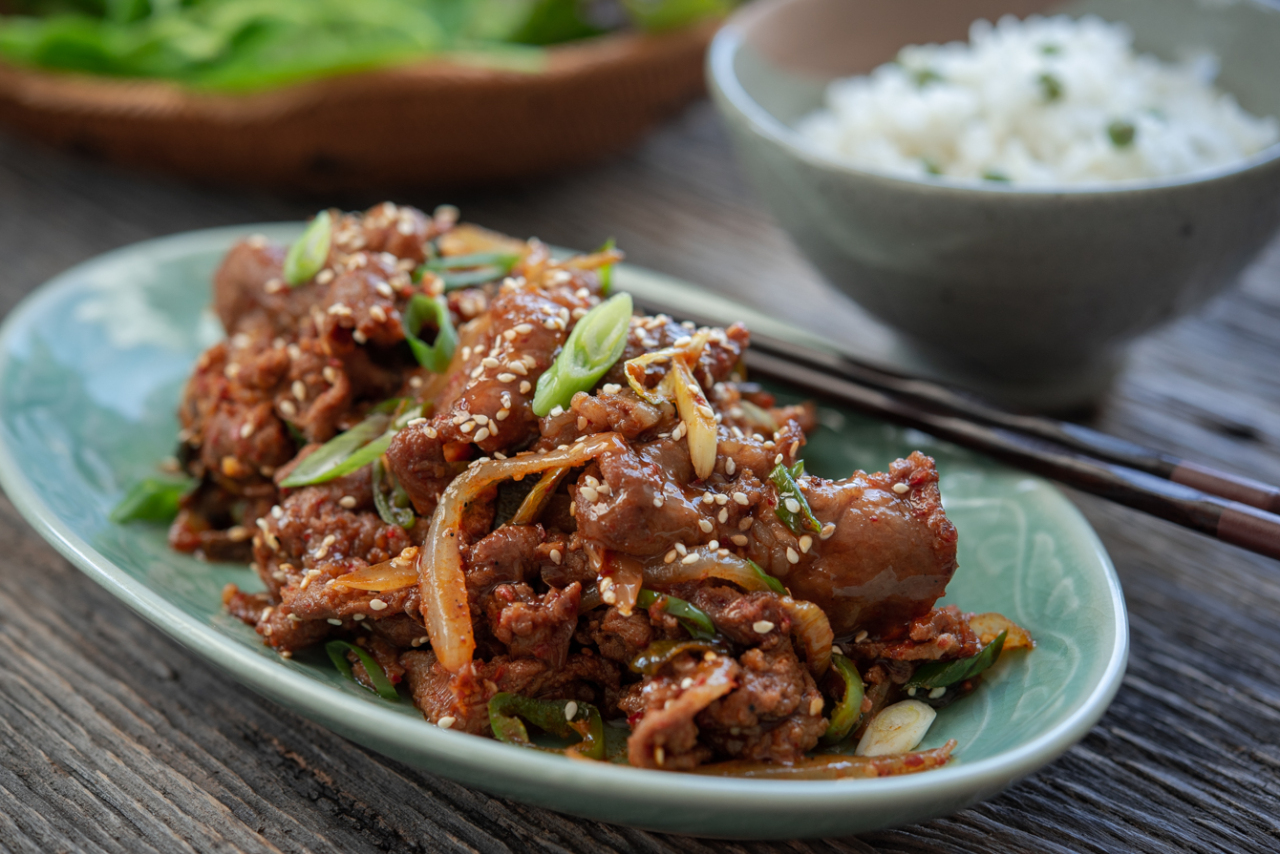 |
Jeyuk bokkeum, spicy Korean pork bulgogi (Holly Ford) |
Pork is a beloved animal protein in Korean cuisine. And this spicy Korean pork stir-fry called jeyuk bokkeum is perhaps the most popular pork dish. Some call it pork bulgogi (dwaeji bulgogi).
Every household cooks this amazingly delicious spicy pork bulgogi from time to time in their own kitchen in Korea because it is so easy and quick to put together, and it always tastes good even if you mess it up.
The main ingredient to season the pork is gochujang (Korean chili paste). This gochujang pork delivers a spicy yet gently sweet taste to the pork. You can adjust the level of spiciness with the amount of chili flakes. You can even skip the chili flakes if you prefer. We, as Koreans, like spicy things to be spicy, though.
The beauty of this Korean pork recipe is that it mimics the taste of that sizzling smoky flavor that is cooked on an extremely hot flaming fire in a professional kitchen, which is not easy to achieve in most home kitchens. I will share my tips on how you can imitate that taste at home.
Unless you decide to marinate the pork ahead of time, this dish takes only a few minutes from start to finish. You’ll have a nice, spicy Korean pork stir-fry ready for dinner in no time! This is one of the easy Korean recipes that can’t go wrong. Serve with rice and lettuce, and you are good to go.

How to make spicy Korean pork bulgogi
Recipe Tips
1. Quick caramelized sugar: Let 2 teaspoon of sugar caramelize in hot oil to get the burnt sugar taste. The smoky flavor adds depth and mimics the flavor that is only acquirable from stir-fry done in flaming hot wok in a professional kitchen.
2. Infused leek (or green onion): Fry chopped Asian leek or green onion with burnt, sugared oil for 30 seconds at the beginning to infuse the flavor. The aroma will penetrate into the pork slices, adding a deeper flavor.
3. Large skillet (wok) over high heat: You will need a large skillet that has enough room to stir around without being crammed. A high heat also helps the steam to evaporate quickly, otherwise the steam will be trapped inside and results in runny sauce. If your skillet (wok) is not big enough to stir-fry the entire batch of pork, divide the pork in half or in portions you desire. If so, you will need to reduce the amount of oil, sugar, and leek to caramelize per batch accordingly.
4. Wearing a disposable food-prep plastic glove will be handy to mix the pork with the seasoning paste. It will protect your delicate hands.
Ingredients• 907 gram pork shoulder or pork butt very thinly sliced
• 2 tbsp canola oil
• 2 tsp sugar
• 1 Asian leek or 4 green onion chopped
• 1/2 large onion sliced
Seasoning paste• 4 tbsp Korean chili paste (gochujang)
• 1-2 tbsp Korean chili flakes (gochugaru)
• 2 tbsp soy sauce
• 2 tbsp sweet rice wine (mirim)
• 2 tbsp sugar
• 3 cloves garlic finely minced
• 1 1/2 tsp ginger puree
• 1 tbsp sesame oil
• 1 tbsp toasted sesame seeds
• 1/2 tsp black pepper
Instructions1. To make the seasoning paste, combine chili paste, chili flakes, soy sauce, rice wine, sugar, garlic, ginger puree, sesame oil, sesame seeds, and black pepper in a small mixing bowl; mix well.
2. In a large mixing bowl, separate each slice of pork and put them in a bowl. Add the seasoning paste and mix well (Wearing a disposable food glove is helpful). You can make this step ahead of time and let it marinate in the refrigerator up to 24 hrs. Or you can go straight to stir-fry without marinating at all.
3. Heat 2 tablespoons of oil in a deep skillet or wok over high heat. Add 2 teaspoons of sugar and swirl the pan around. Let the sugar turn brown and caramelized.
4. Quickly add the chopped Asian leek (or green onion) and stir-fry for 30 seconds to infuse the oil. Add pork and onion. Stir-fry pork and onion until they are fully cooked and tender, about 3-4 minutes. Serve immediately with rice and lettuce (if desired).
*Note: If your skillet is not big enough to stir-fry the entire batch of pork, divide the pork in half or in portion you desire. If so, you will need to reduce the amount of oil, sugar and leeks to caramelize per batch accordingly.
By Holly Ford (
https://www.beyondkimchee.com)
-----------------------------------------------------------------
Hye-gyoung Ford (aka Holly) is a well-known Korean food blogger and the author of the popular cookbook, “Korean Cooking Favorites.” Born and raised in Korea, she has lived in many countries. She shares her recipes and food memories in her blog, Beyond Kimchee. - Ed.
By Korea Herald (
khnews@heraldcorp.com)









